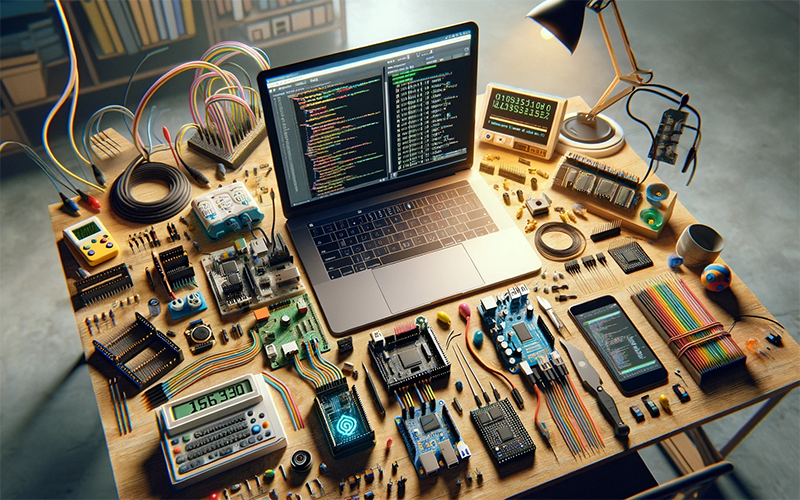In the realm of electronic engineering, microcontrollers play a pivotal role. They are the brains behind a multitude of modern devices, from everyday household appliances to complex industrial machinery.
For aspiring electronic engineers and hobbyists, understanding microcontrollers is essential. This guide serves as a beginner-friendly introduction, illuminating the basics of what microcontrollers are, their diverse applications, and guidance on how to embark on your journey with them.
Understanding microcontrollers
A microcontroller is a compact integrated circuit designed to govern a specific operation in an embedded system. Think of it as a mini-computer on a single chip, comprising a processor core, memory, and programmable input/output peripherals. Unlike general-purpose computers that run various applications, microcontrollers are typically designed for a specific task.
Core components
Processor (CPU): the central processing unit executes the instructions provided by the program. Its speed, measured in MHz or GHz, determines how fast it processes data.
Memory: this includes both program memory (Flash or ROM) for storing the software and data memory (RAM) for temporary data storage during operation.
Input/output ports: these allow the microcontroller to interact with other devices, like sensors, motors, and displays.
Peripheral features: many microcontrollers come with built-in features like timers, counters, communication ports (like USB or Serial), and ADC (Analog to Digital Converters).
Popular microcontrollers for beginners
Arduino: known for its user-friendly platform, Arduino boards are great for beginners. They support a range of sensors and output devices and can be programmed using the Arduino IDE with C/C++.
Raspberry Pi: more powerful than a typical microcontroller, Raspberry Pi is a small-sized computer that can run Linux and perform complex tasks like networking, multimedia processing, and more.
ESP8266 and ESP32: these Wi-Fi-enabled microcontrollers are ideal for IoT (Internet of Things) projects. They are powerful, inexpensive, and support various programming environments.
Applications of microcontrollers
Microcontrollers are ubiquitous in modern technology. Some common applications include:
Home appliances: from microwave ovens to washing machines, microcontrollers are used to control various functions and settings.
Automotive: modern vehicles use microcontrollers for engine control, infotainment systems, airbags, and more.
Medical devices: life-saving medical devices like heart rate monitors and advanced diagnostic systems rely on microcontrollers for precise operations.
Industrial control: in manufacturing, microcontrollers play a critical role in controlling machinery, assembly lines, and monitoring systems.
Consumer electronics: everyday gadgets like smartphones, cameras, and TVs employ microcontrollers for various functionalities.
Getting started with microcontrollers
Choose the right microcontroller: start with something beginner-friendly, like Arduino or Raspberry Pi, which have extensive online resources and communities.
Set up your development environment: install the necessary software to program your microcontroller. For Arduino, it’s the Arduino IDE, and for Raspberry Pi, you’ll need an OS like Raspbian.
Learn the basics: familiarise yourself with basic programming concepts and how to interface with simple input/output devices like LEDs, buttons, and sensors.
Experiment with projects: start with simple projects like blinking an LED, and gradually move on to more complex ones like building a small robot or a weather station.
Join online communities: platforms like Stack Overflow, Reddit, and specific forums for Arduino and Raspberry Pi are great places to learn, ask questions, and share your projects.
Challenges and overcoming them
As you delve into microcontrollers, you might face challenges like understanding circuit schematics, debugging software, or hardware compatibility issues. Overcoming these challenges involves patience, practice, and utilising online tutorials and community help. Remember, every expert was once a beginner.
The future with microcontrollers
As technology advances, microcontrollers continue to get more powerful and integrated into more aspects of our daily lives. Understanding them not only offers a window into how modern devices function but also equips you with the skills to be part of the next wave of technological innovation.
Conclusion
Embarking on a journey with microcontrollers opens up a world of possibilities. Whether it’s for a career in electronic engineering, a hobby, or simply a desire to understand how our digitally-driven world functions, microcontrollers are a fundamental starting point. With curiosity and eagerness to learn, anyone can step into this fascinating world and perhaps, shape the technology of tomorrow.




